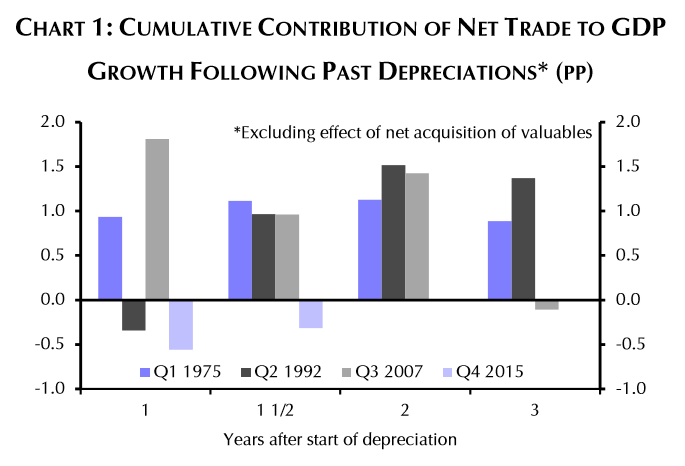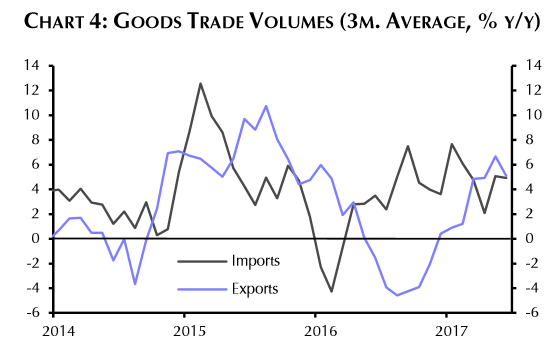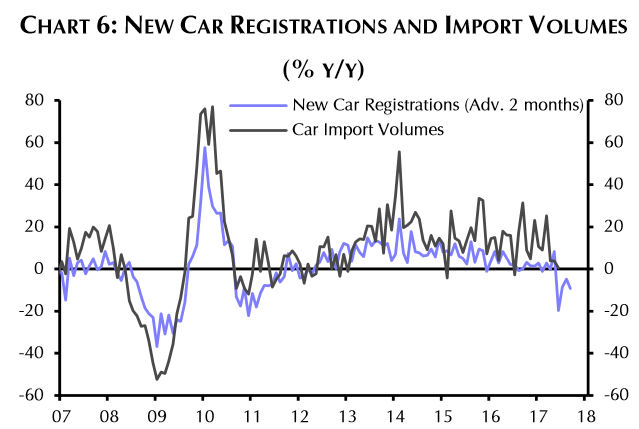Why Pound-Inspired Export Boost to UK Economy Could Still Yet Transpire

The effects of the latest slide in the Pound on the economy have been disappointing, says Capital Economics' Andrew Wishart, but that doesn’t mean things won’t get better in the future.
A weaker Pound would typically be expected to usher in a period of export-lead growth which would help rebalance the UK economy away from being one that is heavily dependent on imports.
However, the significant devaluation of Sterling since the EU referendum in June 2016 is yet to substantially boost the UK's export sector with hard data confirming little positive impact to GDP.
Indeed, second-quarter GDP statistics for 2017 show trade had a neutral impact on GDP.
"Overall, since the Pound started to slide at the beginning of last year, net trade has actually detracted from growth, as opposed to bolstering it," writes Wishart.
"In comparison to past depreciations, it seems the latest leg down in the Pound has proved to be a blank as opposed to a silver bullet for the economy," he goes on to say.
When compared to depreciations of similar magnitudes in 1975, 1992 and 2007; the 2016 one had the added benefit of being accompanied by a rise in global growth, which should have opened up new markets to UK exports and made it even easier for them to flourish.

One reason for the limited reaction could be the relatively gradual fall in the Pound when compared to antecedents, which could indicate there may still be further side-effects waiting to 'pass-through'.
Indeed, Capital Economics argue that it is "premature" to write off any possible boost to trade in the future.
Exports have grown since Brexit broke the Pound even if the overall balance of trade has not.
"Annual growth in goods export volumes reached 5.1% in Q2 having been in negative territory last year," says Wishart.
The poor trade balance is mainly due to a corresponding rise in ‘Imports’ which have eclipsed the positive growth in ‘Exports’.
"Nevertheless, overall it has not been the weak performance of exports, but rather the stronger performance of imports which has been the main factor limiting the boost to net trade," says Wishart.

One reason for the possible harmonization of growth in both exports and imports is the increasingly global nature of "supply chains" which means that components are imported and used to build finished articles which are exported, or indeed used to build more complex components of larger finished articles made in other locales, such that high volumes of imports and exports are moving cross borders all the time.
Another explanation for the high level of imports is the extremely robust levels of domestic consumption which have characterized the UK economy, which account for "over 60%" of GDP, however, it is questionable whether this can continue due to rising inflation and falling real wages.
As a subsector, growth in Service sector exports has not been as strong as in goods, but Wishart puts this down to timing, as the effects can take longer to show for services which sometimes are being consumed over a longer period of time, and as contracts have to be signed.
"Services exports have performed less strongly, which could reflect Brexit uncertainty weighing on demand. After all, services are likely to be consumed over an extended period of time. That said, this could also merely be a timing factor, with the nature of contracts meaning it takes longer for consumption of services to adjust to changes in relative prices," says Wishart.
A further source of growth going forward could come from the impact of a firm's currency hedges expiring to which firms are likely to respond by, "switching from foreign to domestic suppliers where possible."
Imports appear to be falling as real wages decline.
On example of this is due to the fall in New Car Sales:
"While accentuated by the Vehicle Excise Duty increase in April, underlying growth in new car purchases appears to have weakened.
"A rough and ready calculation suggests that, in isolation, a 10% fall in car imports would translate into a 0.2pp boost to GDP from net trade," says Wishart.

However, if this is replicated across all sectors it could represent a fall of 16% in total imports and lead to a substantial boost in net trade.
Overall, therefore, Capital Economics are still confident that the Pound's depreciation could lead to a boost in trade and GDP.
The reason for the lack of growth so far is more due to an understandable lag which is in line with previous depreciations and also an expected reduction in import demand due to falling real incomes.



